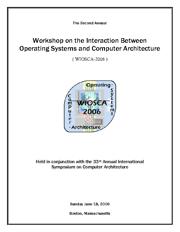Message from the Organizers
2006
2006 IEEE International Conference on Management of Innovation and Technology
Welcome to the second Workshop on Interaction between Operating System and Computer Architecture (WIOSCA). This workshop focuses on characterizing, modeling and optimizing the interaction between the OS and hardware in light of emerging architecture paradigms, workloads and computing technology. The WIOSCA workshop aims at providing a forum for researchers and engineers from academia and industry to discuss their latest research in computer architecture and OS. All submitted papers were
more »
... by the program committee members. At least 5 reviews were written for each paper. Given the quality of the papers that were submitted, it was difficult to decide on the final program. But in the end, the program committee decided to accept 7 papers for this half day workshop. Our goal was to accept as many papers as possible in order to give researchers the chance to present and get feedback on their on-going research. We hope that by doing so we will stimulate interaction and discussion during the workshop. This second edition of the WIOSCA workshop is held in conjunction with the 2006 International Symposium on Computer Architecture (ISCA 33). We therefore would like to thank the ISCA general chair David Kaeli, program chair Mateo Valero, and workshop chair Evelyn Duesterwald for accepting this workshop as part of the ISCA program. This workshop would not be possible without the help and hard work of several people. We would like to thank all the members of the program committee who spent considerable time reviewing the manuscripts. Our gratitude also goes to all members of the IDEAL (Intelligent Design of Efficient Architecture Lab) of the University of Florida, who assisted in this workshop, especially, James Poe, who served as the publicity and publication chairs of this workshop. Finally, we would like to thank all of the authors for their excellent submissions. Please enjoy the program at WIOSCA 2006 and your day in Boston, MA. Abstract Commodity parallel computers are no longer a technology predicted for some indistinct future: they are becoming ubiquitous. In the absence of significant advances in clock speed, chip-multiprocessors (CMPs) and symmetric multithreading (SMT) are the modern workhorses that keep Moore's Law still relevant. On the software side, we are starting to observe the adaptation of some codes to the new commodity parallel hardware. While in the past, only complex professional codes ran on parallel computers, the commoditization of parallel computers is opening the door for many desktop applications to benefit from parallelization. We expect this software trend to continue, since the only apparent way of obtaining additional performance from the hardware will be through parallelization. Based on the premise that the average desktop workload is growing more parallel and complex, this paper asks the question: Are current desktop operating systems appropriate for these trends? Specifically, we are interested in parallel process scheduling, which has been a topic of significant study in the supercomputing community, but so far little of this research has trickled down to the desktop. In this paper, we demonstrate, using several case studies, that contemporary general-purpose operating systems are inadequate for the emerging parallel desktop workloads. We suggest that schedulers designed with an understanding of the requirements of all process classes and their mixes, as well the abilities of the underlying architecture, might be the solution to this inadequacy.
doi:10.1109/icmit.2006.262274
fatcat:bi3pugzzobcjde26cfs2rjtzty

